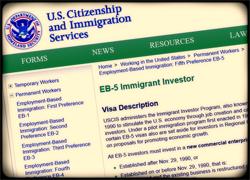There are now three states that play, or have played, a role in the federal EB-5 immigrant investor program, and every single one of them has been mired in controversy. (Most EB-5 regional centers are not affiliated with state governments.)

Late last month, Vermont joined the troubled list, along with the deeply flawed program in South Dakota and the one in Michigan, which had lesser problems.
If you are Vermont's governor, you do not want to see a headline like this one in the state's largest newspaper (the Burlington Free Press) about one of your appointees: "Former EB-5 Regional Center director defends his ethics".
The EB-5 program, run by the U.S. Department of Homeland Security, provides a set of green cards to an alien family making a $500,000 investment in a DHS-approved, but not guaranteed, project, usually in real estate. The middleman organization, between the investor on one hand, and the developer on the other, is called a regional center, and DHS has licensed over 600 of them. In Vermont the only regional center is part of the state government.
Most of Vermont's EB-5 money has gone into ski resorts. One of them, Mount Snow, has just hired Brent Raymond, who had been the EB-5 regional center director. Vermont ethics rules say, according to the Free Press, that "a former state employee is barred from lobbying on behalf of a ... entity he or she previously interacted with."
This puts Raymond in the awkward position of saying "I will not be lobbying any division or agency of the state on behalf of Mount Snow." It leaves one to wonder why he was hired if this is the case, and who will be doing the lobbying if he does not. The office of Governor Peter Shumlin (D) has said "the governor has concerns about the potential for a conflict of interest in this decision [of Raymond's]."
This is doubly difficult for the governor because of Raymond's one-time "exempt" status in his administration; in most circumstances the term means that the official is a political appointee.
The regional centers decide on the appropriateness of proposed investments, set and collect the fees for those transactions, and generally supervise the EB-5 projects. Raymond has previously drawn mixed reviews for being too chummy with the ski resort operators, according to the website VTDigger.
While the Vermont situation is serious, it was much more so in South Dakota, as we reported earlier. The problems in Michigan were comparatively minor.
More Troubles for Vermont's EB-5 Program. While Vermont has no EB-5-related dead bodies or multi-million dollar bankruptcies of EB-5 projects, the main EB-5 user in the state, Bill Stenger, owner of the Jay Peak ski resort and other properties, "has had one tough year," according to the mild-mannered Burlington Free Press.
Stenger and I, incidentally, were two of the three witnesses appearing at the last U.S. Senate hearing on the program, in 2011. He is generally regarded as the favorite EB-5 developer of Sen. Pat Leahy (D-Vt.), who was chairman of the Senate Judiciary Committee at the time.
One of the reasons that Stenger is having a tough year is because of the relentless, detailed reporting on his various business ventures and misadventures by VTDigger.
Among the Stenger-related developments in the past year have been "losing the site for a $100 million project in Newport [VT] and an avalanche of bad press" according to the Free Press. VTDigger has reported, to quote its headlines: Jay Peak Loses Trust of First EB-5 Investors", "Jay Peak Projects Under SEC Investigation", and "EB-5 Investors Question State's Watchdog's Independence".
On that last point, the state government has recently changed how it handles the EB-5 program; it has left the promotional parts of it with the Vermont Commerce and Economic Development Department, but moved the regulatory functions out of that agency and sent them to the Department of Financial Regulation; that sounds like a switch from the cheerleaders to the cops and is probably a very good idea.
